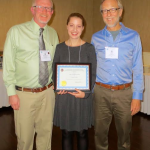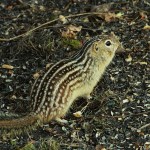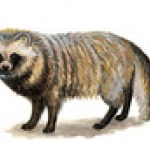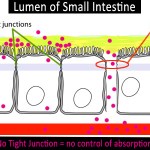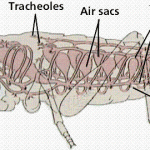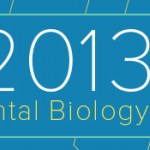EB
Here are the highlights from the final day of the meeting:
Carbon monoxide (CO) is not all that bad: Michael Tift, graduate student at Scripps Institute of Oceanography, described how the body naturally produces CO when red blood cells are broken down and CO can actually be protective against inflammation at low doses. His research was focused on measuring whether species that have more hemoglobin (from living in hypoxic environments) also have more CO. As it turns out, people native to high-altitude Peru do have higher CO levels than those living at lower elevations. Likewise,…
Highlights from today's sessions included:
Norelia Ordonez-Castillo, undergraduate student from Fort Hays State University, presented her research on channel catfish. According to Norelia, these fish can become obese so her research was geared towards trying to find out how their receptor for LDL cholesterol differs from rodents and humans. But what I want to know is whether the obese catfish tastes better...
Image of channel catfish by Ryan Somma via Wikimedia Commons
Christine Schwartz, Investigator from University of Wisconsin-La Crosse, studied how the brain of hibernating…
The 2017 Experimental Biology conference is almost here!
Here are some of this year's highlights:
Dr. Michael Welsh from the Howard Hughes Medical Institute and University of Iowa will be presenting the Walter B. Cannon Award Lecture. He will be speaking about Cystic Fibrosis.
This year's Nobel lecture in Physiology or Medicine will be given by Laureate Dr. Louis J Ignarro who, along with Drs. Robert Furchgott and Ferid Murad, won the prize in 1998 for discovering how nitric oxide works in the cardiovascular system.
I am also looking forward to the many comparative…
I am very excited to report this year's awardees from the Comparative and Evolutionary Physiology Section (CEPS) of the American Physiological Society!
The New Investigator Award is given to a young investigator who has made contributed significantly to the field of comparative and evolutionary physiology. This year's awardee is Casey Mueller from California State University, San Marcos.
Casey Mueller (middle) receiving the New Investigator Award. She is standing with the CEPS Chair, Dr. Michael Hedrick (left) and the 2016 August Krogh Distinguished Lecturer, Dr.…
I am getting my poster presentations ready for the Experimental Biology conference next week in San Diego. In my opinion, this is one of the most exciting conferences as we get to hear about the latest physiology research. I cannot wait to share what I learn with you!
Here is a YouTube video with just some of the reasons others love attending these conferences as much as I do. This video was filmed at the meeting in Boston last year.
Hats off to all of the comparative physiologists who were recognized for their hard work and exciting research at the 2015 annual Comparative and Evolutionary Physiology Business meeting at the Experimental Biology conference earlier this month. I thought I would take a moment to recognize each awardee:
Arthur DeVries (left), University of Illinois: 2015 Krogh Distinguished Lecturer (Image Credit: Tom Ecay, CEPS Secretary)
Karen Sweazea, Arizona State University: New Investigator Award (Image credit: Tom Ecay, CEPS Secretary)
Csilla Ari, University of South Florida: Research…
Day 4 of the meeting turned out to be pretty exciting for a comparative physiologist as well.
The first session that I went to was called "RNASEQ approaches to understanding extreme physiological adaptations." Considering the Comparative and Evolutionary Physiology section business and dinner meeting was the night before, I was impressed at my ability to make it to an 8:00am session the following morning.
The first seminar from Dr. Brooke C Harrison (Univ. Colorado, Boulder) was on "Extreme cardiac growth and metabolism in the Burmese python after feeding." He spoke about how the cells…
Day 3 of the Experimental Biology meeting was arguably one of the most exciting for comparative physiology. Here are the highlights from Monday:
Morning Seminars:
Birgitte McDonald from Aarhus University, Denmark presented, "Deep-diving sea lions exhibit extreme bradycardia in long-duration dives." Birgitte and Dr. Paul Ponganis measured the heart rate of California sea lions (Z. californianus) using digital electrocardiogram loggers and found that the heart rate was reduced (bradycardia) during dives along with reduced blood flow to the lungs and periphery. This helps preserve the oxygen…
Check out the world's fastest animal (relative to its size):
This research was featured at this year's Experimental Biology conference!
Another exciting day at the Experimental Biology meeting for physiologists! Although I am a bit nervous about the session on the negative effects of sleep deprivation, "Sleepless in San Diego: Is Sleep Deprivation the New Silent Killer?" Hmmm, maybe I should have gone to bed a bit earlier last night...
Dr. Karen Matthews (Univ of Pittsburgh) has studied the effects of sleep deprivation in teens from low-income families found that less than 6 hours of sleep per night can negatively impact mood, academic achievement and health.
Another talk that I found interesting was on how sleep deprivation…
The meeting is off to a good start.
I attended a session sponsored by the American Physiological Society on Animal Models of hypertension caused by the nervous system, or neurogenic hypertension. While their definition of comparative really only meant rats, dogs and humans, I found it very interesting nonetheless. The speaker, Dr. Olson from the University of Minnesota, explained the pros and cons of trying to develop devices to treat neurogenic hypertension using different animal models. The reason why rodents are not good models is because they are too small to develop devices for in…
I am very excited about the Experimental Biology conference that starts this weekend. I have my bags packed, my poster printed and I am heading to the airport to catch my plane. I can't wait to learn about all of the exciting physiology (especially comparative physiology) research. I will be sure to keep you up-to-date as well!
I am very excited about the upcoming Experimental Biology conference that starts next weekend. I just looked through the Spring newsletter for the Comparative and Evolutionary Physiology section of the American Physiological Society. Check out the exciting programming in comparative physiology at this year's conference:
Monday, April 28
10:30 AM – 12:30 PM
Featured Topic: Abstract-Driven Trainee Session
3:15 PM – 5:15 PM
Featured Topic: Comparative Physiology of Aging and Senescence
Tuesday, April 29
8:00 AM – 10:00 AM
CEPS Symposium: RNAseq Approaches to…
Another exciting day for Comparative Physiology! I just got back to my hotel after the wonderful dinner meeting overlooking the Harbor.
Of course, the research was exciting too :)
Here are the highlights from today's sessions:
Heinrich E, Bradley T. Univ California, Irvine I learned a lot about the insect tracheal system this morning. Insects do not have continuous gas exchange with environment like we do. Rather, gas exchange is discontinuous and involves valves, called spiracles:
Diagram of how insects breathe from www.breatheornot.wordpress.com
When carbon dioxide levels increase…
The Comparative and Evolutionary Physiology section held their Scholander Poster competition for young comparative physiologists today! It was exciting to see all of the students present their work.
Here are some of the highlights:
Raffaele Pilla, Dominic P, D'Agostino, Carol S. Landon, and Jay B. Dean from Molecular Pharmacology and Physiology, University of South Florida, Tampa, FL. These researchers demonstrated that a ketone body, often thought of as waste products resulting from the use of fats for energy, can have protective effects against seizures caused by exposure to…
As always, the opening ceremony for the American Physiological Society at the Experimental Biology meeting was awesome! The food was probably the best I have had at these meetings, which along with the fun band, probably explains why it was jam-packed with Physiologists eager to kick-start this meeting.
I am looking forward to the Scholander poster session tomorrow. This poster session is sponsored by the Comparative and Evolutionary Physiology section of The American Physiological Society. It is a competition in which trainees present their research in the hopes of receiving a travel award…
